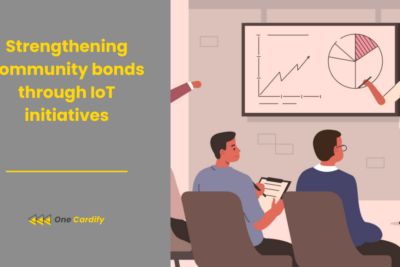
IoT and the future of autonomous vehicles
The Internet of Things (IoT) has changed our perception of transportation and is at the forefront of the shift towards an autonomous vehicle driven future. It is not only about the cars driving themselves; rather, it is about development of the whole connected system that improves efficiency, safety, and the overall the travel experience.In this in-depth analysis, we discuss the role IoT technologies play in creating smart, self-driving vehicles, and what this entails for the future of transportation. The implications are very many and promising starting from improved road safety to less traffic jam and environmental benefits.Let us now explore the world of connectivity and smart automation that prepare for the futureof transport, explaining the mutual dependence between IoT and the future of autonomous vehicles.
The Backbone of Modern Mobility
IoT acts as the core of modern transport solutions which combine different technologies in order to make autonomous vehicles smarter, safer, and more efficient. IoT devices enable real-time data transfer that makes vehicles interact among themselves and with the road infrastructure.This communication is vital for improving navigation, improving traffic flow, and giving safety aspects that can stop accidents from occurring before they do. Through large networks of sensors and data-analytic systems, autonomous vehicles become aware and able to maneuver through a complex environment more efficiently than ever.But, the way has its difficulties. Issues regarding data privacy, cybersecurity, and infrastructure compatibility are paramount. Nonetheless, improvements in technology and regulatory environments are slowly resolving these problems.Looking into the future, the unification of IoT with autonomous vehicles will not only change the meaning of transportation but also influence the sustainable and efficient future.
Related content
Driving Towards a Connected Future
Consider a world when your car drives itself and chats with traffic lights, parking spots, and even pedestrian devices making the entire trip smooth. It is the possibility for integration of IoT and autonomous driving technologies.By use of modern sensors and V2X (vehicle-to-everything) communication systems, vehicles can exchange and receive relevant information concerning their environment which leads to decreased risks of accidents and better traffic management.This level of connectivity is an enabler for smart cities which means that transport systems operate in unity decongesting the cities and reducing on the amount of emissions.In addition, the IoT enabled vehicles’ data can be utilized in understanding the travel trend through which the better urban planning and infrastructure development could be achieved.
Enhancing Safety and Efficiency
Autonomous vehicles present one of the most convincing arguments because they have the ability to reduce road traffic accidents greatly. Since human errors, which cause almost all car crashes, will be eliminated, self-driving vehicles can prevent deaths.This is where IoT technologies are crucial, allowing vehicles to see their environment with the precision never seen before and take decisions on the fly. These advancements from obstacle detection to driver’s health monitoring are critically important in developing the roads safety.Apart from safety, the efficiency gains are quite remarkable. Autonomous vehicles are capable of optimization of routes, speed adjustment pursuant to the traffic conditions, and elimination of unnecessary idling, which results in fuel saving and less emissions.
Prospects and Challenges
While we proceed into the era of autonomous vehicles, the outlook is indeed thrilling. Nevertheless, the route is also lined with obstacles.Technological challenges, legal and ethical complexities, and social acceptability are some of the things to be faced. In addition, the completion of this transition depends on a strong, flexible IoT infrastructure and sophisticated cyber security solutions that will enable protection against threat.Notwithstanding these challenges, the energy of IoT and autonomous vehicles is very high. Cooperative initiatives of tech companies, car manufacturers, and governments are establishing the foundations of an innovative and fair transport ecosystem.
Frequently Asked Questions
IoT is vital for autonomous vehicles as it enables real-time communication and data exchange between the vehicle and its environment, making navigation, safety, and efficiency improvements possible.
By facilitating advanced sensing and communication capabilities, IoT technologies allow autonomous vehicles to detect and respond to potential hazards with greater accuracy, thereby reducing the chances of accidents.
While not a silver bullet, they can significantly mitigate congestion through optimized routing, efficient traffic management, and reduced human driving errors that often contribute to bottlenecks.
Greater efficiency and optimized driving patterns can lead to reduced fuel consumption and emissions, contributing to cleaner air and a healthier planet.
Key challenges include data privacy and security, technological and infrastructure readiness, and legal and ethical considerations surrounding autonomous decision-making.
The timeline varies significantly by region and technological advancement. However, progressive steps towards automation are being made, with some level of autonomy already present in many modern vehicles.
Education on the benefits and challenges, participation in smart city initiatives, and advocacy for supportive policies and infrastructure investments are critical steps for readiness.
Embracing the Future
IoT is set to revolutionize which we live, work and travel through integration with autonomous vehicle technology. By these means, we are at the eve of the most revolutionary change in the mobility.As we move through the obstacles and grasp the chances, the path to the connected, autonomous future goes on. The future is promising and the opportunity for a good change is enormous.Through innovation and cooperation, the concept of connected cars through the internet of things is now coming true and signifies the dawn of a new era of transportation.With stakeholders uniting from all walks of life, the future of the IoT-driven autonomous vehicles looks quite promising as it is expected that these vehicles will revolutionize the living standard of the entire humanity and their lives will be significantly improved.






Related Posts